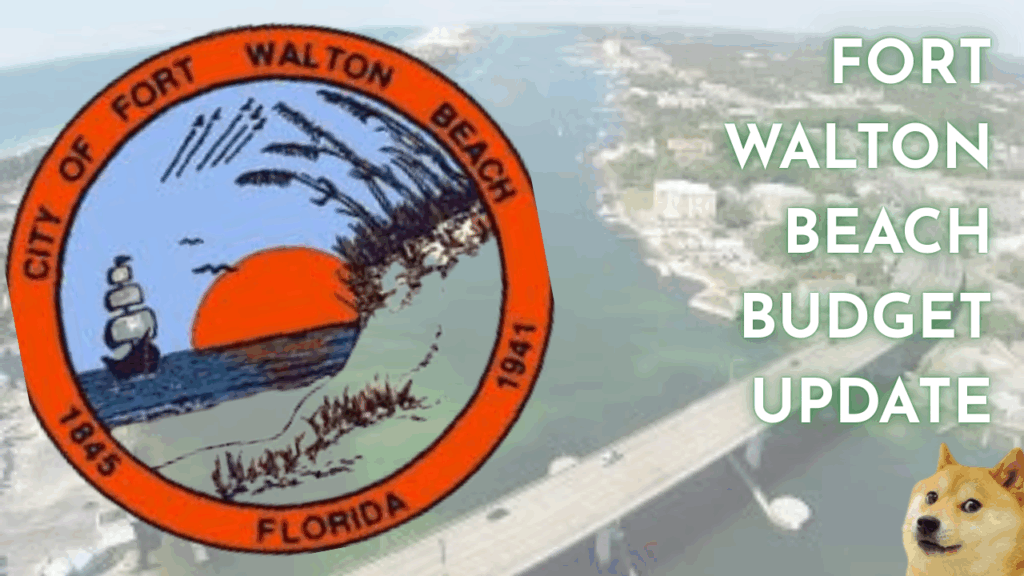
📊 Budget Shortfall: City faces $8M gap in 2025-26 budget, plus $3M in proposed capital projects.
🕵️ State Review: Manager requests voluntary DOGE audit from governor’s office to examine spending.
📉 Spending Cap Compliance: Payroll growth held at 2.83%, operating expenses down 2.35% to meet voter-approved limits.
FORT WALTON BEACH — At Tuesday’s budget workshop, Fort Walton Beach officials delivered updates on the 2025-26 spending plan while also introducing an unexpected development: a request for a voluntary “DOGE” audit with the governor’s office.
City Manager Jason Davis told council members that as part of broader accountability efforts, he had “reached out to the governor’s office for a voluntary DOGE audit”—referring to Florida’s Department of Government Efficiency (DOGE) initiative launched under Governor Ron DeSantis to scrutinize municipal finances and cut wasteful spending.
This aligns with Florida’s expanding “DOGE” task force reviews, which have targeted city and county budgets statewide, including recent audits in Jacksonville and Gainesville, and more recently, a review of Hillsborough County’s $9 billion budget.
The initiative, promoted as fiscal oversight, has also stirred concern from some leaders around the state who argue it may be more performative than practical.
Davis reaffirmed that the city had met the voter-approved charter’s spending limits by keeping payroll growth to 2.83% across all funds and cutting the general fund operating expenditures by 2.35%
“The first three weeks… we dedicated to getting the payroll under the 3%,” Davis said. “That’s gonna allow us to put some money towards incentive pay…”
The proposed $52.1 million revenue budget faces $66.8 million in expenses, with sewer, sanitation, water, and golf operations generating the most significant income at $22.6 million.
Ad valorem taxes at the existing 4.3282‑mill rate are projected to raise $9.88 million, $8.28 million for the general fund and $1.6 million for CRA initiatives.
Public works remains the most oversized line item at $23.5 million, followed by public safety ($17.5 million), general government ($10 million), and recreation ($8.5 million).
Staffing would be reduced by 3.6%, from 324.93 to 313.83 full-time equivalents, despite a 3.5% hike in health insurance costs.
A significant portion of the discussion revisited a charter amendment passed in November 2024, which caps annual spending growth at 3% or the CPI increase, whichever is lower, using the prior year’s actual expenditures as a baseline.
Councilmember Payne Walker contended that fiscal year 2023-24 should serve as the reference point, arguing that it was the only year of true “actuals” available to voters in November 2024.
“The only actuals… we had in November of ’24 were the actuals from the budget of’ 23-’24,” Walker stated. “So to think… that the voters said, ‘I want you to go forward in here,’ not logical to me.”
City Attorney Jeff Burns countered: because the referendum passed after the 2024-25 budget year had begun, local leaders have discretion over its initial application.
“The only reasonable way to read it is that it would be used for this first budget cycle, with the prior year being 2024-2025. The process had already been undergone for the 2024-25 year before the passage of that amendment.”
Mayor Nic Allegretto added that shortly after the amendment’s approval, the previous council voted on the implementation approach—paralleling later motions from Councilmember Bryce Jeter to adjust timing.
Walker recommended seeking a formal opinion from the Florida Attorney General to ensure fidelity to the voters’ intention, and several council members appeared supportive of that step.
Davis confirmed that the city still faces a general fund shortfall of approximately $8 million, plus more than $3 million in proposed capital projects. Staff will continue to refine the capital project list over the coming weeks.
In September, the council is slated to evaluate potential millage rate reductions to the midpoint (4.1919) or rollback (4.0596) levels, before finalizing the budget on Sept. 23.
Councilmember David Schmidt noted his appreciation for staff achieving the spending target and pledged to “continue to advocate and support user fees” to bolster revenues without raising taxes.
Davis assured Walker and other members that a balanced budget would be presented during the scheduled hearings.
“Oh, yeah, absolutely,” said Davis.
Register or login with Mid Bay News and never get another pop up on our site!